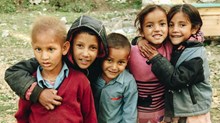2020 May Finally Be Over, But the Plight of Refugees and Other Immigrants Is Not
2020 was a hard year. The coronavirus pandemic upended lives and forced millions of Americans to stay socially distanced and isolated. Many spent Christmas apart from family for the first time ever. As we enter the new year, I know we’re all yearning for a return to normal so that we can reunite with our friends, families and loved ones.
But the anguish and loneliness many of us feel right now should give us a deep sense of empathy for immigrants and refugees who have been separated from family for much longer and can’t count on a return to normal.
I think of Arooj, who was resettled as a refugee by World Relief in 2017. Arooj’s husband, Sunny, eventually escaped Pakistan after being tortured for his Christian faith, but their hopes to be reunited in the U.S. have been repeatedly deferred. The number of Pakistani Christians resettled to the U.S. has dropped as overall levels of refugee resettlement have fallen from about 85,000 in fiscal year 2016 to fewer than 12,000 last year. The couple has spent just one year in the same country since their marriage eight years ago. It’s hard to sustain a marriage by video calls.
More than a decade ago, close friends of mine fled their home in East Africa after facing threats of political persecution. But the whole family could not make the trip: the oldest son, whom I’ll call Pierre, had recently turned 21 and was unable to access the temporary visa necessary to accompany his family to the U.S. Pierre’s mom applied for and received asylum, then applied for her green card, then filed a petition for Pierre to join the rest of the family in the U.S. But that process takes many years because of tight limits within our archaic immigration laws; for some countries of origin, such as Mexico, waits can stretch to multiple decades.
Pierre finally arrived earlier this year and was reunited to his family after more than a decade apart. Gratefully, Pierre arrived just before the president banned most overseas processing of family-sponsored immigrant visas altogether. That ban, which would have barred Pierre had he not arrived before April 23 of last year, was recently extended by President Trump until March 31, further prolonging the separation of many other families.
My former next-door neighbor, whom I’ll call Elena, came to the U.S. in 1990, crossing the border unlawfully out of economic desperation – fueled, in part, by her compulsion to provide for her five-year-old son, whom she left with her parents in Mexico. No mother makes that choice except under duress, but it’s a decision many have made. To quote the title of journalist Jason Parle’s book chronicling the multi-generational experience of a Filipino family that faced similar dynamics, sometimes “a good provider is one who leaves.”
Elena is desperate to embrace the son whom she left behind thirty years ago. Her U.S.-born younger children have traveled to Mexico to meet their brother, but Elena’s undocumented status means that if she leaves, she could not return. She prays for some sort of a legalization that will allow her to see her oldest son and her mother at least once more.
Other families are forcibly separated by our immigration policies. Most Americans recall the news of thousands of children being separated from their parents as a result of “zero tolerance” policy enacted along the U.S.-Mexico border beginning in 2017. While the underlying policy was rolled back after public outcry, more than 600 children have still not been reunited to their parents, who, thus far, have not been located.
However, while that policy was new and particularly visceral, children have actually been separated from parents under both Democratic and Republican administrations on a much larger scale as a result of deportations. Under the Obama administration, as many as 92,000 parents of U.S. citizen children were deported in a single year. While in some cases the children accompanied the parent in leaving the U.S., many others stayed behind with a remaining parent or an extended family member, while thousands of others ended up in foster care. And it’s still happening: other former neighbors of mine are facing a pending deportation hearing for the father; if he is deported, his wife will be left behind with their eight children.
Some of the most egregious situations of family separation are likely to change with a new administration: President-elect Biden has promised to dramatically increase refugee admissions and to reunify children and parents separated at the border by the current administration, and he will have the authority to do so by executive action. He could immediately resume overseas visa processing, as evangelical leaders have urged him to do. But other changes – such as reducing backlogs for family reunification visas or any process to allow undocumented immigrants to earn permanent legal status – will require bipartisan congressional action.
A growing number of evangelical Christians, who historically have championed “family values,” argue that the best way to achieve those policy changes – to keep families together and reunite families without eroding the rule of law – would be a restitution-based immigration reform. Unlike an amnesty policy, which might keep families together but would not honor the law (and which would be destined for political failure), a restitution-based reform would allow immigrants in the country unlawfully to pay a fine as a penalty for having violated U.S. immigration laws, then to earn permanent legal status if they meet appropriate qualifications. Thousands of evangelical Christians have added their name to a call for this sort of approach in the past year, echoing various denominational leaders, Christian college and seminary presidents and parachurch ministry executives.
Whenever I FaceTime with extended family members and yearn to be able to be with them again, I’m reminded to pray for my immigrant friends and neighbors to be able to embrace their loved ones again one day, too.
Matthew Soerens is the U.S. Director of Church Mobilization & Advocacy for World Relief and the coauthor of Welcoming the Stranger: Justice, Compassion and Truth in the Immigration Debate (InterVarsity Press, 2018). He has also frequently taught a course on Refugees and Forced Migration for Wheaton College’s M.A. in Humanitarian & Disaster Leadership program.
The Better Samaritan is a part of CT's
Blog Forum. Support the work of CT.
Subscribe and get one year free.
The views of the blogger do not necessarily reflect those of Christianity Today.






















